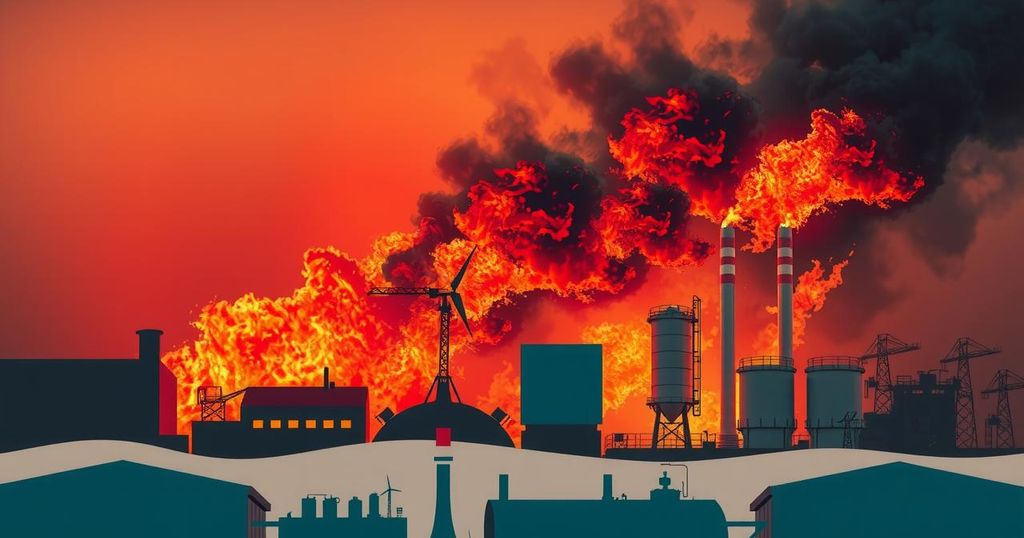Addressing Climate Change: Increasing Fire Risks in the Middle East

Climate change is heightening fire risks in the Middle East, prompting experts to gather at the Intersec 2025 Fire & Rescue Conference to examine these challenges. Prolonged heat and drought are straining firefighting efforts, leading to the necessity for technological advancements and sustainable strategies. Key discussions will focus on AI applications, water scarcity challenges, and resilience-building in fire safety methods, amidst broader regional initiatives to enhance preparedness for climate-induced threats.
Climate change is undeniably amplifying fire risks across the Middle East, raising significant concerns for regional firefighting efforts. The upcoming Fire & Rescue Conference at Intersec 2025, to be held from January 14-16 at the Dubai World Trade Centre, will center its discussions around these urgent issues. Experts will examine how increasing temperatures, prolonged droughts, and severe weather events create unprecedented challenges for both urban and industrial landscapes.
Current projections indicate the UAE could endure between 133 to 144 extreme heat days per year by the year 2050, whereas Saudi Arabia could face 108 to 124 such days. These alarming scenarios are compounded by severe water shortages and prolonged dry spells, significantly straining firefighting resources, even in regions with sparse vegetation.
In an anticipatory statement, Dana Nassif, Senior Consultant at WSP Middle East, remarked, “Rising temperatures and droughts are increasing fire risks across the Middle East. Water scarcity poses a significant challenge for firefighting systems, particularly as urban areas expand. Addressing these risks will require sustainable water strategies, advanced fire technologies that utilize artificial intelligence (AI) and predictive modeling, and a focus on resilience in building designs.”
Moreover, a study conducted by Think Hazard in 2020 highlighted a concerning trend, predicting that both the UAE and Saudi Arabia are likely to encounter heightened risks of water scarcity within the next decade, with drought occurrences projected to average once every five years. Paul Jennings, Assistant Fire Commissioner at Red Sea Global, reinforced this notion, stating, “At Red Sea Global, ensuring the safety and well-being of our guests is our top priority. We take this responsibility very seriously and have implemented comprehensive in-house emergency response protocols to address any potential situations swiftly and effectively.”
Both nations are taking proactive measures to bolster their resilience in the face of climate change, exemplified by Saudi Arabia’s substantial $6 billion investment in 200 water projects aimed at mitigating drought impacts, alongside the UAE’s Water Security Strategy 2036. The Intersec 2025 conference will delve into vital advancements and strategies transforming fire safety systems, highlighting sessions on AI-driven fire prediction technologies and the challenges related to water scarcity in firefighting operations.
The event is expected to attract 1,200 exhibitors from 60 countries, covering major sectors such as Fire & Rescue, Commercial and Homeland Security, and Cyber Security. Notable companies such as NAFFCO and Bristol Fire Engineering are anticipated to showcase innovative technologies tailored to evolving industry demands. Grant Tuchten, Portfolio Director at Messe Frankfurt Middle East, stated, “Intersec 2025 will provide a platform for fire safety experts, technology innovators, and decision-makers to address the growing fire risks in the Middle East. By showcasing cutting-edge solutions and fostering collaboration, we are committed to advancing resilience and safety across the region.”
The article discusses the rising fire risks in the Middle East attributed to climate change, particularly the increase in heatwaves, droughts, and extreme weather conditions. It underscores the challenges facing firefighting operations in urban areas, where water scarcity and heat extremes are becoming more acute. The content highlights the upcoming Intersec 2025 Fire & Rescue Conference scheduled for January 2025 in Dubai, which will focus on addressing these climate-related challenges and exploring technological innovations in fire safety. Key stakeholders and experts are expected to convene to discuss strategies for enhancing resilience against these heightened risks.
In conclusion, climate change poses significant challenges to fire safety in the Middle East, necessitating comprehensive discussions and actionable strategies at the forthcoming Intersec 2025 Fire & Rescue Conference. With alarming projections of extreme heat days and increased water scarcity, it is imperative for regional authorities and industry leaders to collaborate on innovative fire safety solutions. The commitment to investment in advanced technologies and sustainable practices will be crucial in effectively managing the growing fire risks in the region.
Original Source: premierconstructionnews.com







